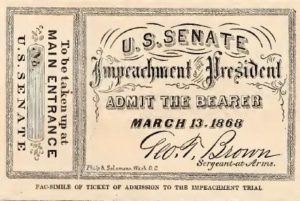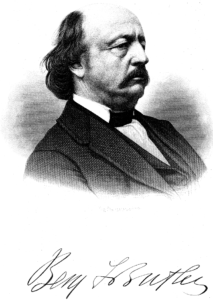Friday, March the 13th in 1868 was a dramatic day in Washington, D.C. Having been summoned by the impeachment court on March 8th, President Andrew Johnson was expected to appear in the United States Senate 150 years ago today. Things didn’t turn out exactly as anticipated, but onlookers saw some humor in the events. Although he didn’t use the term, a correspondent viewed the lawful and orderly proceedings as an example of American exceptionalism.
From The New-York Times March 14, 1868:
Special Dispatch to the New-York Times.
WASHINGTON, Friday, March 13.
The supreme majesty of the law and the power of this republican government was illustrated anew to-day by the fresh scenes and proceedings in the great trial of impeachment. The business-like, almost matter-of-fact manner in which the Congress of the United States proceeds with this grave work is the most striking illustration of the innate love and reverence for law and order that characterize the American people. The numerous intelligent representatives of foreign nations who looked upon the proceedings of to-day must have been again impressed with the feeling that a nation that can without the ruffling of a single temper, or the trembling of a single interest, calmly address itself to so great an event as the trial of its Chief Executive, must be well-entitled to the proudest position upon the face of the earth.
The proceedings to-day were characterized by deeper interest, increased importance and greater solemnity than usual. The preparations for the formal opening largely balanced the general effect of the scene, and it is well at the outset to say that the arrangements for admission were all successfully carried out by the Sergeant-at-Arms, and a very disagreeable matter made as agreeable as possible. The audience began to gather in the Senate galleries as soon as the cordon of Police received word to let ticket-holders pass, and by 12 o’clock the seats were comfortably filled. …
At 1:10 o’clock the Managers on the part of the House appeared and were duly announced. The Senators who had not yet been sworn … then advanced to the bar and were sworn by the Chief Justice. The return of the Sergeant-at-Arms to the summons, as sworn to by that officer, was then read, and the Chief Justice then ordered him to call upon the accused to appear and answer. In a loud voice, and amid the stillness of the whole Chamber, he called three times, “ANDREW JOHNSON, ANDREW JOHNSON, ANDREW JOHNSON!” There were hundreds among that intelligent audience, who bent forward and eagerly strained their eyes, expecting the President to appear in response to that stentorian behest. But instead of the President, who should come in at the precise moment of the last call, like his very evil genius, but BENJAMIN F. BUTLER, all alone, stopping in a half-startled way at the first tier of seats, and looking up at the presiding officer as if to say “Here I am.” There was a singularity about this coincidence, which was marked by a titter around the whole hall. The President’s room, in the rear of the Senate, had been assigned for the use of his counsel, and the door in the rear corridor of the Senate lobby soon opened, and [members of Mr. Johnson’s team of attorneys] Ex-Attorney-General STANBERY, Judge B.R. CURTIS, of Boston, and Hon. THOMAS A.R. NELSON, of Tennessee, then appeared and took their seats. …
As Hans L. Trefousse explains:
From the very start, Johnson’s attorneys decided that he should not appear at the trial in person, and when, on March 13, the crier loudly summoned the president, the expectant crowd waited in vain. To the great amusement of onlookers, only Ben Butler walked in, looking up at the presiding officer in startled disbelief. Johnson was to speak only through counsel; his lawyers, and particularly Stanbery, told him that under no circumstances was he to give any further interviews to the press. And they were right. …
Nevertheless, it was difficult for the president to take this advice. Several times he criticized his lawyers for what he deemed an inadequate demurrer or reply to various charges, especially after Alexander H. Stephens on March 16 urged him to conduct his own defense. Drawing on his experience with Johnson during ten years in Congress, the former vice president of the Confederacy maintained nobody could do it better, and Johnson was more convinced than ever of his own skill.[1]
- [1]Trefousse, Hans L. Andrew Johnson: A Biography. New York: W.W. Norton & Company, Inc., 1997. Print. pages 317-318.↩




